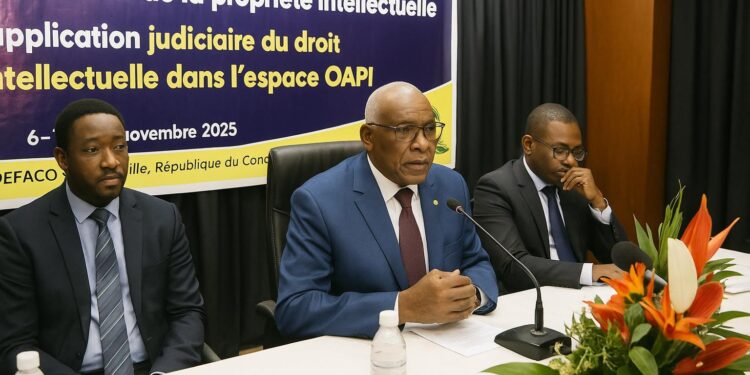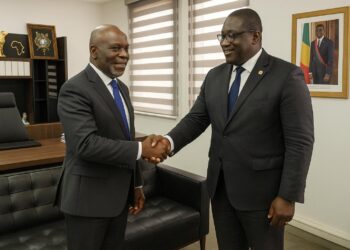Magistrates hone IP litigation skills in Brazzaville
Fifty-five Congolese judges gathered in Brazzaville on 4 November for an intensive workshop devoted to intellectual-property litigation. The week-long programme is regarded as one of the most ambitious capacity-building initiatives undertaken by the Republic of Congo’s judiciary in recent years.
The course was co-organized by the Ministry of Industrial Development and Private-Sector Promotion and the Ministry of Justice, with technical backing from the African Intellectual Property Organization, OAPI. Government and regional officials have framed the event as a cornerstone of Congo’s pro-business legal reforms.
Delegates completed nine modules covering general IP concepts, the Congolese court system, industrial property disputes, copyright matters, artificial intelligence and emerging technologies. Trainers emphasised procedural rigour as well as the economic stakes attached to piracy, counterfeiting and the misappropriation of brands or creative content.
OAPI partnership bolsters legal infrastructure
OAPI’s involvement is significant. The 17-member intergovernmental body serves as the regional registry for patents, trademarks and designs across Francophone Africa. By anchoring the training in OAPI jurisprudence, Brazzaville aims to harmonise domestic practice with precedents recognised in markets from Yaoundé to Abidjan.
Antoine Thomas Nicéphore Fylla Saint Eudes, OAPI’s board president, closed the workshop by encouraging participants to join the African Network of IP-Specialised Judges. Membership would enable rapid peer-to-peer consultations on complex filings, a facility many multinational investors consider vital for transactional certainty.
Regional harmonisation carries reputational dividends. In its 2023 assessment, the African Development Bank highlighted predictable dispute resolution as a driver of foreign direct investment inflows to OAPI jurisdictions. Congo’s decision to operationalise that recommendation through magistrate training aligns neatly with the national development plan.
Industrial versus creative rights: nuanced training
A recurring theme was the distinction between industrial property—patents, trademarks, utility models—and literary or artistic rights covering music, software and audiovisual works. Trainers used case law from Cameroun and Côte d’Ivoire to illustrate how damages calculus, injunction standards and evidentiary burdens diverge across the two domains.
Discussions on artificial intelligence drew particular interest. Judges explored scenarios where machine-generated code or content challenges traditional notions of authorship. While no Congolese statute yet addresses AI originality, familiarity with comparative doctrine allows courts to avoid rulings that could deter tech-centric investors.
Participants also examined the interface between national commercial courts and general jurisdiction courts. Under existing legislation, patent and trademark disputes fall to commercial benches, whereas copyright matters are typically heard by courts of first instance. Clarifying this division was viewed as essential to procedural economy.
Policy recommendations for stronger enforcement
Upon conclusion, magistrates issued recommendations to the executive. Foremost is a dedicated law codifying the respective competences of commercial and high courts in intellectual-property matters. Officials at the Justice Ministry signalled openness, noting that a draft is already circulating within the inter-ministerial legal commission.
Participants urged closer institutional ties between OAPI and national training centres. They proposed regular refresher courses for judges and clerks, plus the inclusion of IP modules in the syllabus of the National School of Administration and Magistracy, ENAM, which graduates most of Congo’s judicial officers.
The communiqué further calls for a jurisprudential bulletin documenting seminal Congolese rulings alongside landmark decisions from other OAPI members. Such comparative transparency could reduce forum shopping and encourage enterprises to litigate locally rather than abroad, preserving legal fees within the domestic economy.
Business case: why investors should care
For manufacturers, agribusiness exporters and telecom operators, enforceable trademarks and patents underpin licensing agreements and franchise valuations. Weak enforcement historically inflated risk premiums in Central Africa. By equipping judges with specialised tools, Brazzaville signals that contract breaches involving intangible assets will be adjudicated swiftly and consistently.
Investor-state dispute data compiled by UNCTAD show that IP-related conflicts now account for roughly six percent of arbitration cases concerning African host states. A judiciary versed in contemporary doctrines could thus deter escalation to costly international forums, protecting both sovereign and private balance sheets.
Technology start-ups, an emerging pillar in Congo’s diversification agenda, stand to benefit directly. Venture capital termsheets usually include representations about patent ownership or software copyright. Local courts able to verify those claims enhance bankability and may unlock the regional seed funding that entrepreneurs crave.
Next steps for a secure innovation hub
Officials indicate that a follow-up workshop focusing on border enforcement against counterfeit goods is planned for early 2024, subject to budget clearance. Customs officers, prosecutors and economic-crime investigators will be invited, expanding the ecosystem of actors conversant in IP protection.
Provided the momentum is sustained, Congo-Brazzaville could evolve into an innovation hub bridging Central and West African markets. For now, the newly trained magistrates return to their benches armed with comparative jurisprudence and a shared resolve to make intellectual property a pillar of economic resilience.
Legal practitioners interviewed in Brazzaville note that predictable IP rulings also support the government’s ambition to launch a national innovation fund, envisioned in the 2022–2026 National Development Plan, by reassuring potential co-investors.












































